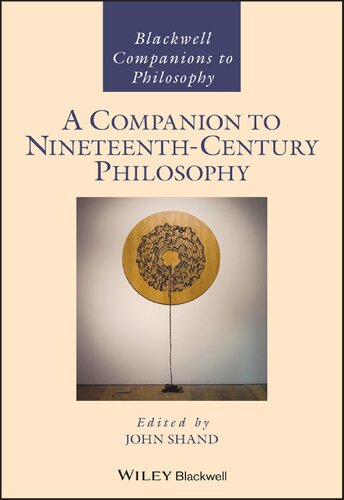

Most ebook files are in PDF format, so you can easily read them using various software such as Foxit Reader or directly on the Google Chrome browser.
Some ebook files are released by publishers in other formats such as .awz, .mobi, .epub, .fb2, etc. You may need to install specific software to read these formats on mobile/PC, such as Calibre.
Please read the tutorial at this link: https://ebookbell.com/faq
We offer FREE conversion to the popular formats you request; however, this may take some time. Therefore, right after payment, please email us, and we will try to provide the service as quickly as possible.
For some exceptional file formats or broken links (if any), please refrain from opening any disputes. Instead, email us first, and we will try to assist within a maximum of 6 hours.
EbookBell Team

4.4
62 reviewsInvestigate the challenging and nuanced philosophy of the long nineteenth century from Kant to Bergson
Philosophy in the nineteenth century was characterized by new ways of thinking, a desperate searching for new truths. As science, art, and religion were transformed by social pressures and changing worldviews, old certainties fell away, leaving many with a terrifying sense of loss and a realization that our view of things needed to be profoundly rethought.
The Blackwell Companion to Nineteenth-Century Philosophy covers the developments, setbacks, upsets, and evolutions in the varied philosophy of the nineteenth century, beginning with an examination of Kant’s Transcendental Idealism, instrumental in the fundamental philosophical shifts that marked the beginning of this new and radical age in the history of philosophy. Guiding readers chronologically and thematically through the progression of nineteenth-century thinking, this guide emphasizes clear explanation and analysis of the core ideas of nineteenth-century philosophy in an historically transitional period. It covers the most important philosophers of the era, including Hegel, Fichte, Schopenhauer, Mill, Kierkegaard, Marx, Nietzsche, Bradley, and philosophers whose work manifests the transition from the nineteenth century into the modern era, such as Sidgwick, Peirce, Husserl, Frege and Bergson.
The study of nineteenth-century philosophy offers us insight into the origin and creation of the modern era. In this volume, readers will have access to a thorough and clear understanding of philosophy that shaped our world.